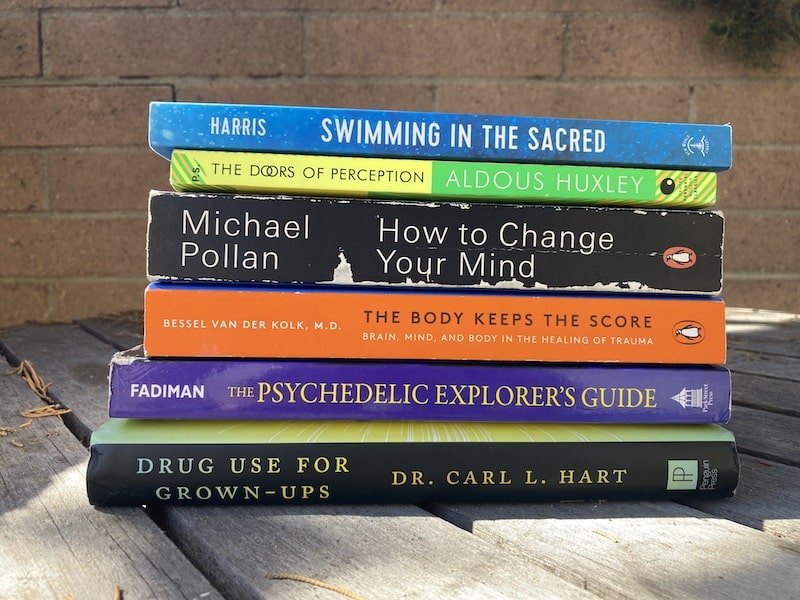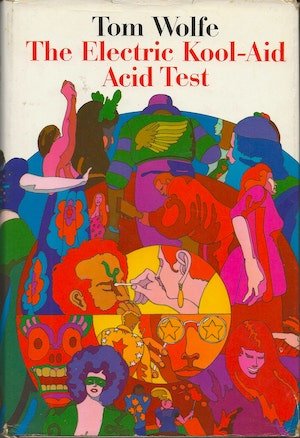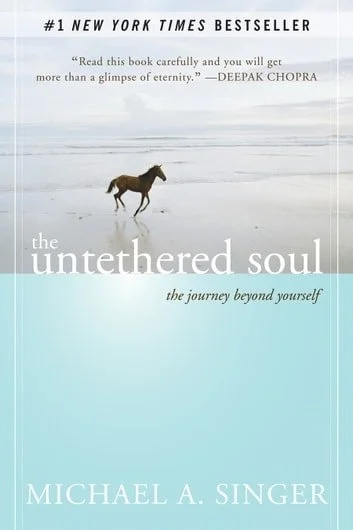Books About Psychedelics
If you're thinking about psychedelics, then you've probably heard of them through someone you know or someone you trust. Think back to the person who first introduced you to psychedelics. Was it a family member or a friend? Maybe it was a media figure or an author.
At Pivot, we see many clients interested in psychedelics after reading a book on them (or watching a documentary).
Psychedelic literature, research, and news are growing in popularity.
There are hundreds of resources out there about these substances. And yet, it can seem hard to know where to get started.
We've found a handful of books particularly helpful for us and our clients to better understand these mind-altering substances.
Our list here is far from comprehensive, but we trust it will serve as a nice launch pad for anyone looking to discover.
Psychedelic Literature: Research, Microdosing, and Psychedelic Assisted Therapy
The first section includes all books on psychedelics, and it's listed in our recommended sequence from beginner to advanced on the subject.
The books span a range of topics, from traditional lineage to clinical trials with these medicines.
Are these the "best books"? We think so, but we would love to hear your feedback and suggestions.
In the second and final section, we talk about a few fantastic non-psychedelic books that have taught us a great deal about mental health and well being.
We hope you enjoy!
The Psychedelic Explorer's Guide: Safe, Therapeutic, and Sacred Journeys by James Fadiman, Ph.D
In this book, clinician and researcher James Fadiman dives into psychedelic assisted therapy and guiding in ceremonial containers.
It's been described as some as the "bible" for a guided, therapeutic journey.
While the book is based on hundreds of guided ceremonies with LSD, its lessons are applicable for all plant medicines. Fadiman's research helped keep the momentum behind guided journeys alive and active.
It outlines the basics of preparation, journeying with medicine, and aftercare following the experience. To explore the psychedelic therapy process, there are fewer better resources than this book.
A Really Good Day: How Microdosing Made a Mega Difference in My Mood, My Marriage, and My Life by Ayelet Waldman
"Mommy-Track" mystery novelist Ayelet Waldman speaks openly about her experience microdosing LSD..
Waldman, a mother, writer, and someone regarded as an up-standing citizen may not seem like the "typical" person looking for a psychedelic experience. However, she has microdosed consistently and experienced positive changes in her mood, marriage, and work.
She's shares her microdosing experience in this work, which invites readers to consider how psychedelics might impact their lives.
How to Change Your Mind by Michael Pollan
There's a resurgence of psychedelic research today, exploring plant medicines and their potential to help with depression, addiction, dying, trauma, and more.
It might seem like a 'new science', but where was it before? Why did it stop? Where is it going?
In this NY Times Best Seller, experiential journalist Michael Pollan delves into psychedelics in the 21st century.
Pollan not only talks about psychedelics, he uses them. In the 'Travelogue: Journeying Underground' section, he shares his experience in guided psychedelic therapy with LSD, psilocybin, and 5-MeO-DMT.
If you're looking to watch rather than read, check out the four part docu-series How To Change Your Mind on Netflix.
Swimming in the Sacred: Wisdom from the Psychedelic Underground by Rachel Harris
Psychedelic research and science expands to explore questions about human nature, consciousness, and the treatment of depression and anxiety.
But there's a whole world of healers holding ceremonial space with medicine and clients right now. Psychologist and writer Rachel Harris explores the underground plant medicine healing space and the women who've kept traditional lineage alive.
This fascinating account of 20+ female healers who share their stories anonymously clues us into the vastness of psychedelic healing and encourages us to consider the use of psychedelics beyond the boundaries of Western medicine.
Food of the Gods: The Search for the Original Tree of Knowledge — A Radical History of Plants, Drugs, and Human Evolution by Terence McKenna
In this 1993 book, renowned botanist and mystic Terence McKenna dives into the relationship between humans and plants over time.
Humans are drawn mind-altering drugs. We change consciousness regularly with caffeine (coffee, tea), alcohol, cannabis, stimulants, and psychedelics.
Assuming responsible use, most people think some level of altering consciousness is a good thing. History suggests it's just human nature.
McKenna explores the unique role that plants, particularly mind-altering ones, have played in human progression and self-discovery.
The Electric Kool-Aid Acid Test by Tom Wolfe
Considered by many the marquee book of the psychedelic movement of the 60s, the 'The Electric Kool-Aid Acid Test' chronicles a merry gang, the “Merry Pranksters”, who explore the power of LSD, intersubjectivity, and life more broadly.
The book documents pivotal moments in American culture including the beginning of the "hippie" movement evolved from the now dormant beat generation.
In addition to its prowess as a psychedelic hallmark, the book published in 1968 is a great example of New Journalism. This literary style of news included submersing oneself in the experience and using imagery along with facts to tell a story. We take this for granted now, but at the time it was brand new to media.
One of the activities of the Merry Pranksters involved creating meaningless tasks, randomly assigning them, and then completing them, while judged by group members on a scale of 1-5 for brilliance. This seems to be the inspiration for the British game show Task Master, which involves five contestants completing tasks and being judged on this same scale.
If you're interested in storytelling, experimentation, and the emergence of LSD in the hippie scene, then you'll likely enjoy Tom Wolfe’s tale.
Psychedelic Mysteries of the Feminine: Creativity, Ecstasy, and Healing Edited by Maria Papaspyrou, David Luke, & Chiara Baldini
Hear from a variety of professionals who've recount their experience at the intersection of the feminine and psychedelics.
This book explores the unique feminine qualities of the psychedelic experience, traditional shamanic healing, and the connection to feminine energy.
In this read, you'll dive into the relationship between the feminine and psychedelics throughout history, from traditional use to clinical research. It prompts the reader to consider how embracing "femtheogenic" wisdom in the context of plant medicines might help society heal.
Despite the natural connection between female consciousness and healing, the prominent plant medicine field is largely dominated by men.
Voices in the book call for women with an interest in the psychedelic space to bring their energies forward.
The Psychedelic Experience: A Manual Based on the Tibetan Book of the Dead by Timothy Leary, Richard Alpert (Ram Dass), & Ralph Metzner
The authors, long standing researchers, cultural figures, and experienced psychonauts, explore the future of psychedelics in the 21st century.
They explore their personal and professional experience and traditional practices, interpreting various facets of humanity through the Tibetan Book of the Dead.
Consciousness, mysticism, spirituality, and the divine are all on the table and under investigation with this story telling piece.
To conclude, the book posits a framework for guided sessions, not unlike Fadiman's Psychedelic Explorer's Guide.
Drug Use for Grown-Ups: Chasing Liberty in the Land of Fear by Dr. Carl L. Hart
Carl Hart, Columbia University Professor and former chair of the Department of Psychology, talks about our nation's dark history with drugs like cocaine, methamphetamine, and heroin.
He writes as both a research scientist and recreational user.
That's right. Dr. Carl Hart uses meth and heroin from time to time. And he claims it's helped him be a better father, husband, and professional (he is an Ivy League professor after all).
This seemingly provocative book provides a very basic idea to help humanity: legalize and regulate all drugs and we'll save lives and tax payer's money.
Skeptics who've relied on moralistic, abstinence-only approaches to substances will find their beliefs challenged. Hart's argument is based on research and the data is all too convincing.
People only interested in legalizing psychedelic drugs (a framework known as “psychedelic exceptionalism”) will have their ideas challenged too.
Many readers on both sides of the political isle have found Carl Hart's research and teachings profoundly helpful.
The book provides an avenue for Americans to think differently, embrace our freedom, and adopt a healthier approach to drug use.
The Doors of Perception by Aldous Huxley
Famous author of Brave New World, Aldous Huxley recounts his experiences with mescaline.
In the mid-20th century, Westerns were open to psychedelics for the first time. Their understanding of the human brain and mind was deepened through plant medicines.
Huxley explores realms of consciousness and transcendence in Doors of Perception, written and published in 1954.
He also posits the potential for expanded perception to help humanity in a top-down fashion: basically, if political leaders went through an altered state experience like a psychedelic journey, they may see things more clearly and make better decisions. An interesting idea!
Psilocybin Mushrooms of the World: An Identification Guide by Paul Stamets
Mycologist Paul Stamets gives an overview of over 100 mushrooms including psilocybin containing mushrooms.
Stamets shares both scientific information about these fungi and their use as medicine in a variety of cultures around the world.
For those eager to learn about the therapeutic or ceremonial use of magic mushrooms, this book is an excellent guide.
Other Fantastic Books About Therapy in General
You might be thinking: Okay, enough with the plant medicines!
We realize that not everyone wants to read psychedelic books all of the time.
And luckily there are far more books about mental health, spirituality, and well being.
We've chosen just four books to support you on your discovery journey.
These works have had a profound impact on our lives, including how we work with clients. From meditation and mindfulness to dying and transcendence to storing emotions in the body, these books are all uniquely insightful.
The Power of Now: A Guide To Spiritual Enlightenment by Eckhart Tolle
Our perceptions, beliefs, and attitudes inform our suffering and pain. What if we could target these preconceived thought patterns and initiate a shift towards living in the moment?
This level of personal insight is a challenge, but it might be easier than you think.
In this book, spiritual teacher Eckart Tolle presents basic, yet effective principles for cultivating a mindset rooted in the present.
By grounding into the present, we can live more fully, achieve personal growth, and connect with our spiritual selves more easily.
The Untethered Soul: The Journey Beyond Yourself by Michael Alan Singer
Seeking inner peace and joy? Start here.
Michael Singer draws from meditation and mindfulness to invite the reader into their inner worlds.
It can be daunting, it can be messy, it can be difficult. But doing this level of 'excavation' and diving deep into your thoughts and feelings will leave you with a more whole existence that is at-ease.
The Body Keeps the Score by Dr. Bessel van der Kolk
Human trauma is all around us today, in developing and wealthy countries alike. Bessel van der Kolk and his colleagues collect their clinical work with trauma survivors to propose a novel idea: we store trauma in both the brain and body.
Recovery through some non-traditional methods, somatic methods of healing - such as yoga and sports - are incredibly effective at a clinical level. Perhaps, there's more to our pain and suffering than what we can measure in the mind.
This paradigm-shift book encourages us to expand our understanding of mental health and consider healing as not just a mental task, but a "whole-person" activity.
The Five Invitations: Discovering What Death Can Teach Us About Living Fully by Frank Ostaseski
Death and life are inseparable. We can't have one without the other. And while it can seem strange to ponder death, doing so may actually be a good thing.
Author Frank Ostaseski draws from his experience as an end-of-life servicer to hospice patients. He prompts the reader to recognize that we cannot change the past and we cannot avoid our inevitable, limited time on earth..
Dark? In some ways, yes. But you can uncover immense light by considering these five invitations to live more fully:
Don't Wait
Welcome Everything
Bring Your Wholeself
Find a Place of Rest
Embrace A 'Don't Know' Mind
Parts of the book are beautiful, some tug at your heart strings, and all of it can clue you into living with more joy.
A Final Word On These Books
When we share our story or the story of another with someone, we pass along something meaningful.
We think that these are some of the best books on psychedelics and therapy, but we know that the majority of them are rooted in a Western medical culture dominated by white men. Our sincere hope is mainstream literature will embrace stories told by people and within traditions more diverse than this narrow landscape.
That said, we believe each there's something to learn from everything and these books have certainly taught us a great deal.
If it's not too much trouble, we'd love to hear what books on plant medicines you like! Feel free to send us a note and we'll share it with the Pivot newsletter audience.
















